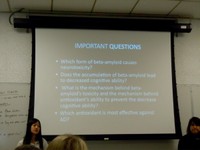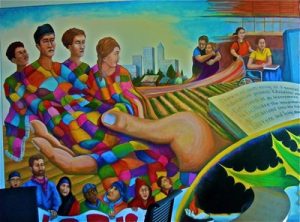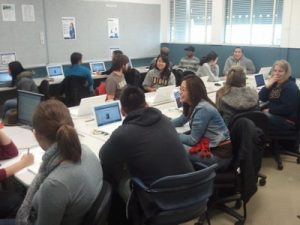Fall 2012
Tuesdays 5:10-8:00 PM
2102 Student Community Center (SCC)
Professor Chris Thaiss
cjthaiss@ucdavis.edu
Homepage: thaiss.ucdavis.edu//a>
Office Phone: 530-754-9197
Office: 385 Voorhies
Office Hours: TR 10:30-11:30 AM; T 3:30-5:00 PM
Introduction
A seminar in Writing Program Administration is becoming a standard course in PhD programs in Composition and Rhetoric. Featuring such courses shows recognition of the leadership roles that scholar-teachers in this field are frequently asked to take on in the colleges and universities that hire them. Such courses also reflect the burgeoning scholarly and programmatic literature devoted to the history, theory, and practice of writing program administration. That this scholarship has grown so rapidly reflects in turn the seriousness with which higher education–and society in general–regards the teaching of writing (and literacy more broadly considered) in a global culture of multi-modal information.
Especially in the U.S., where “English composition” has held sway in most colleges as a required course (or courses) for well over a century, “WPA work” has usually meant organizing and maintaining large numbers of sections–and supervising to some degree a large number of teachers, tutors, and/or teaching assistants. Moreover, because of the way that “writing proficiency” has been theoretically constructed in the U.S., even a smaller school might have several levels of writing administrators: e.g., a “basic” or “developmental” writing director, a director of first-year writing, a writing center director, a director of writing across the curriculum (WAC/WID), etc. At large universities, sheer size dictates further ranks of WPAs–directors and assistant directors of the aforementioned programs, plus directors of advanced writing, of a writing minor or major, of a technical communication program, of a master’s and/or PhD program, of writing placement, of assessment, of writing and new technologies, and so forth. It’s little wonder that a large literature has grown up around this proliferation of specialist jobs, and that new hires are often expected to shoulder at least part of the administrative load.

And that’s only talking about higher ed: considering the importance of learning to write K-12 means adding other administrative competencies within English or language arts units, even if these are not so clearly delineated as at the college level. K-12 education, for better or worse, still rarely separates writing as a separate administrative competency from reading in the language arts; hence writing is often merged with other literacies in admin or specialist positions.
Similarly, since writing proficiency has become one of several goals in departments and courses outside English studies, “WPA work” is a silent, yet increasing, component of curriculum development across the disciplines, especially in higher ed, as WAC/WID emphases in colleges have proliferated. Moreover, with the spread of the new Common Core Standards in K-12 across the states, writing in all disciplines will become a measurable expectation.
In this first iteration of the WPA course at Davis, I’m framing it as an intro to (at least part of) the broad range of meanings that “WPA” may have. In part because we are fortunate at UC Davis to have a wide and growing array of levels and facets in our ecology of writing, ours can be a working laboratory for investigation of many meanings of “WPA work.” Hence, this course won’t be a practicum for a specific WPA job, e.g. director of first-year required writing (which at many schools in the U.S. is still the main, if not only, manifestation of a writing curriculum). A major goal of mine for this seminar is to have us explore, at least briefly, a workable number of types of writing administration, as they have been created not only here but at other places in the U.S. I would like you by the end of this course to have a fairly good grasp of what “WPA” does, can, and might mean in the U.S. context, to help begin to prepare you for what you may encounter in your career as a teacher and scholar. I hope this varied introduction will help you begin to see where you would like to fit as a potential curriculum leader.
At the same time, there will be an opportunity for you, in the term project for the seminar, to delve more deeply into the theoretical and practical literature of a specific type of WPA work and/or of a related issue that particularly grabs your interest.

Finally, while this course will primarily uncover aspects of writing management in the U.S., at least a small part of our investigation will be of contexts outside the U.S.–where other theories and practices have grown up, and where, with influences from many directions, exciting variations of writing organization have taken shape.
All in all, I look forward to an exciting quarter, and to my own and our mutual learning.
Books and Other Resources
Three books are required reading for the seminar:
Irene Ward and William Carpenter, eds. (2002) Sourcebook for Writing Program Administrators. New York: Pearson Longman. (SWPA)
Anne Ellen Geller, Michele Eodice, Frankie Condon, Meg Carroll, Elizabeth Boquet (2007). The Everyday Writing Center: A Community of Practice. Logan, UT: Utah State University. (EWC)
Linda Shamoon, Rebecca Moore Howard, Sandra Jamieson, Robert Schwegler, eds. (2000). Coming of Age: The Advanced Writing Curriculum. Portsmouth, NH: Heinemann. (COA)
Among other books that are available free and online and that we will be using in the course are these:
Susan McLeod (2007). Writing Program Administration. Anderson, SC: Parlor Press and Fort Collins, CO: The WAC Clearinghouse.(WP)
Susan McLeod, Eric Miraglia, Margot Soven, and Christopher Thaiss, eds. (2001). WAC for the New Millennium: Strategies for Continuing Writing-across-the-Curriculum Programs. Urbana, IL: National Council of Teachers of English. Available at: The WAC Clearinghouse. (WNM)
George Otte and Rebecca Williams Mlynarczyk. (2010). Basic Writing. Reference Guides in Composition and Rhetoric. Anderson, SC: Parlor Press and Fort Collins, CO: The WAC Clearinghouse (BW)
Chris Thaiss, Gerd Bräuer, Paula Carlino, Lisa Ganobcsik-Williams, Aparna Sinha, eds. (2012). Writing Programs Worldwide: Profiles of Academic Writing in Many Places. Anderson, SC: Parlor Press and Fort Collins, CO: The WAC Clearinghouse. (WPWW)
Indeed, the Clearinghouse (under the leadership of Mike Palmquist) has now made available 40 classic NCTE texts and more and more new books in composition and rhetoric, with more coming in two new series. I will be on a panel (with Mike and others) at the 2013 CCCC Conference on what we call the “Sustainable Publishing Initiative.”
Organizational memberships:
For purposes of this course, I urge (but won’t require) you to join the National Council of Teachers of English (NCTE) and the Council of Writing Program Administrators (CWPA), both of which offer reduced membership fees for graduate students and provide many print and online services, plus conference information. Each will provide a subscription to a major journal, e.g. College Composition and Communication or WPA: Journal of the Council of Writing Program Administrators.
Policy Statements from NCTE and CWPA
WPAs and writing initiatives generally have been immensely helped over the years by policy statements put forth by the NCTE and CWPA. Perhaps the most famous of these have been the WPA Outcomes Statement for First-Year Writing and Students’ Right to Their Own Language. But many other policy papers have helped to improve working conditions for writing teachers and administrators, while others have helped shape curriculum and improved school and learning conditions for students. A recent statement (2011) with increasing impact is the Framework for Success in Post-secondary Writing, co-authored by NCTE, CWPA, and the National Writing Project (NWP), the preeminent teacher development organization for writing in K-12 education.
Listserves:
An assignment of this course will require your joining for this quarter a major online community pertinent to the work of WPAs. The “flagship” such community is WPA-L, administered at Arizona State, but others you may find more pertinent to your needs include WAC-L (writing across the curriculum), WCENTER (writing centers), EATAW (European Association for the Teaching of Academic Writing), TESL-L (Second Language Learner Programs), and the National Writing Project (NWP) online community, among others. If you belong to a different active teaching/learning/writing online community, bring it to my attention to post here. It may be the list that you’d most productively follow this quarter.

Course Schedule and Due Dates
T Oct 2 Introductions–Meanings and Histories of WPA Work; have read SWPA essay by Gebhart; WP ch. 3, “History of Writing Program Administration.”
T Oct 9 First-Year Writing; have read SWPA chs. by Ward, Ward and Perry, Smit, and Huot and Schendel. Begin twice-weekly Communal Blog entries.
T Oct 16 Basic and Developmental Writing; have read BW, chs. 1,2.; have browsed several BW websites, e.g. UC Davis’s Entry Level Writing Program. Bring to class your one page or less proposal for your literature review. Include description, rationale, and short tentative list of sources (including possible interview subject(s)).
T Oct 23 Writing across the Curriculum/Writing in Disciplines; have read WNM essays by McLeod and Miraglia, Townsend, Condon; College Composition and Communication (Feb. 10) essay byThaiss and Porter (link); Across the Disciplines (Fall 2011) essay by Zawacki and Cox (link)
T Oct 30 NOTE SCHEDULE CHANGE: Writing Programs Worldwide; have read WPWW essays by Thaiss, Carlino, Zuckermann et al., Archer, and Gonano/Nelson. Guest: Susan Thomas, director, the Writing Hub, University of Sydney
T Nov 6 Writing Centers; have read EWC, with particular attention to ch. 7. You might also peruse the International Writing Centers Blog, hosted by the Writing Lab Newsletter. We will set upthe tentative schedule of your literature review presentations this evening.
T Nov 13 Upper-level Requirements and Courses; have read COA Part 3, plus essays by Howard (intro) and Lunsford; Pt. 4 essay (on CD) by Fischer and Thaiss; have browsed UC Davis UWP 102 and 104 course descriptions
T Nov 20 Writing Majors and Minors; have read NCTE report/table on the writing major and browsed several program websites, including UC Davis UWP Professional Writing Minor; have readWPWW article by Turner and Kearns; COA (on CD) essays by Conefrey and McCormick. Complete final entries of Communal Blog.
T Nov 27 Master’s and PhD Programs; have read Rhetoric Review and Consortium of Doctoral Programs in Rhetoric and Composition annual listings; have browsed selected program websites.Due: first complete draft of your literature review, for small-group workshop.
T Dec 4 Presentations
M Dec 10 Revised draft of Lit Review due by 5 PM.

Assignments
Theory, Research, and Administrative Practice ‘Blog (30 % of course grade)
From Week Two to Week Eight, you’ll take part in a twice-weekly SmartSite forum based on the topics and readings for that week’s class. You’ll be responding both to the assigned material and to one another’s comments. (As inspiration for some of your entries, feel free to cite comments from contributors to the listserve you join–but you are not required to have such allusions.) Hence, I’d like you to log in twice a week, so you can contribute in the early and more advanced stages of the conversation. These commentaries should be thoughtful, incisive reflections on the topics in relation to your teaching and student work within writing programs, your consideration of administrative issues, and (if applicable) your developing research. I’d like the tone of these remarks always to remain thoughtful and congenial. It’s fine to disagree with a colleague or with me, but I ask you to do so in the spirit of collegiality. Feel free to use your space not only for your written entries, but also to insert images, links, etc., pertinent to our discussions.
Literature Review on a WPA-relevant Topic (30% of course grade)
This will be your primary inquiry of the seminar, and it will result in a 10-15 page paper (roughly 3000-4000 words) due (first draft) our next-to-final class and in revision during exam week. I’d like you to identify a topic of interest related to WPA work and to find and analyze the scholarly literature on that topic. You won’t have time for an exhaustive search, but you should aim for at least ten sources (I’ll be flexible on this). As applicable to your topic, your source list may also include published program websites and other relevant material not in refereed publications.Further, I’d like your study to include an interview with at least one key WPA informant–from anywhere in the US or, if applicable, from outside the US–who either through publications or their administrative experience can shed good light on your topic . Your topic may concern any of the branches of WPA work we cover in the seminar, or others that you identify.
I’d like you to frame your study with a question that will give focus and provide direction for the inquiry. Such questions might include, for example, “To what extent and how are physics faculty in the US involved in WAC/WID programs?” “What are the most common models of course design in first-year writing programs in California?” “How are tutors in writing centers in community colleges trained and mentored?” Whatever topic and question emerges in your thinking, you’ll need to give me a proposal (see schedule) for my approval.
Presentation of Literature Review Project (10% of course grade)
Over the last three evenings of the course, we’ll hear presentations (10 minutes each, plus 10 min. discussion) from the members of the seminar on the literature reviews on which all of you have been engaged. Think of the presentation as an outline/summary of your full project: a summary of its focus, of the main writers who have influenced your own thinking on the topic, and of your conclusions. Please accompany your oral explanation with a one-page handout that helps us follow along, and feel free to use the several tools of the computer classroom for visuals. If you wish, you might consider this presentation as practice for a conference presentation.
Seminar Participation (30% of course grade)
Your full, active, well-prepared, and thoughtful participation in our discussions is essential toward both the success of the course and your own success in it. I look forward to many evenings of productive, intense, enjoyable discussion and to excellent online conversations as well.

Grades
I will grade your performance holistically at the end of the term on all the above work. Please feel free to ask me at any time for my assessment of your progress.
S= Satisfactory or outstanding performance of all assignments on time and according to stated criteria will earn an S. It should go without saying that all written work should be carefully proofread and conform to Edited American English syntax (unless your use of US non-standard forms in your literature review is part of conscious production relevant to the topic of your essay).
U=It has been rare for me to have to give an Unsatisfactory grade in this course or in any graduate seminar. Indeed, I’ve come to expect high quality from almost all members of these seminars. If you have to miss a meeting of our group or if there is danger that you might not complete an assignment, please let me know as much in advance as possible.


